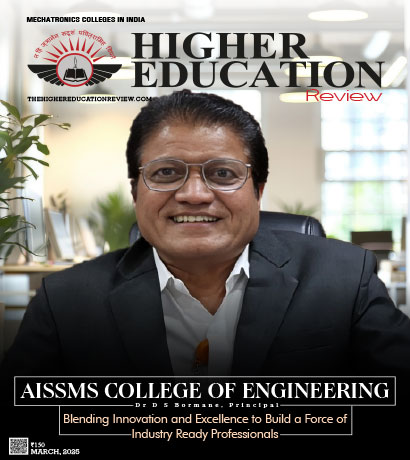Adapting Higher Education: Nurturing Skills For Tomorrows Job Market And Tech Landscape

Dr. B. Narendra Rao, Professor and Program Head - (AI&ML), Mohan Babu University
Dr. B. Narendra Kumar Rao brings over 15 years of experience, having chaired three international conferences like the International Conference on Data Analytics, Intelligent Computing, and Cyber Security-2021. He is affiliated with IEEE, ACM, CSTA, and IAENG. In an interaction with Keerthana, Correspondent, Higher Education Review, Dr. B. Narendra Rao shared his views and thoughts on how higher education institutions can enhance their focus on developing soft skills among students to ensure they are well-rounded and adaptable professionals, as well as how universities can encourage an entrepreneurial mindset among students.
Given the rapid evolution of industries, how do you believe higher education institutions can proactively update their curriculam to ensure students are equipped with the necessary skills for emerging job roles?
Higher education institutions must continuously update their curricula to meet emerging job roles. This involves close collaboration with industry leaders to identify evolving skills and integrate them into various disciplines. A focus on fostering soft skills like communication and problem-solving, along with offering flexible interdisciplinary programs, allows students to tailor their learning to their interests and career goals. We have to prioritize this alignment with industry demands and have engaged with several industry leaders like IBM, SAP Etc, to ensure our graduates are adaptable and well-prepared for today's dynamic professional landscape.
How can higher education institutions enhance their focus on developing soft skills among students to ensure they are well-rounded and adaptable professionals?
To enhance soft skills among students, universities can integrate practical experiences like internships and service-learning projects into the curriculum. Furthermore, dedicated workshops and coaching sessions focusing on communication, emotional intelligence, and leadership can equip students with the tools they need to excel in the workplace. In our curriculum, we embed such opportunities to provide practical courses across all programs, fostering communication, teamwork, and problem-solving abilities. This ensures our graduates emerge as well-rounded and adaptable professionals.
Entrepreneurial skills are increasingly important in today's job market. How can universities encourage an entrepreneurial mindset among students?
Universities play a crucial role in nurturing an entrepreneurial mindset by offering programs in business planning, marketing, finance, and innovation. Guest lectures, workshops, and on-campus incubators further inspire and support aspiring entrepreneurs, providing them with essential skills and resources to succeed. From Internship to Entrepreneurship, these courses collectively expose students to the multi-disciplinary nature of the world.
What role should experiential learning play in higher education to equip students for the evolving job landscape with AI & ML courses?
Experiential learning is vital for equipping students with practical skills in AI and ML. By integrating hands-on projects and ethical considerations into the curriculum, universities prepare graduates to address real-world challenges and stay abreast of technological advancements. Universities have to prioritize experiential learning by seamlessly integrating it into every laboratory course. This ensures that students not only grasp theoretical concepts but also acquire practical skills such as data analysis, algorithm implementation, and solution development, tailored to meet the needs of students at various levels.
Given the rapid technological advancements, how can universities incorporate emerging technologies like AI & ML into their curriculum to better prepare students for future job roles?
To prepare students for future job roles, universities should develop dedicated courses, interdisciplinary programs, and state-of-the-art laboratories for emerging technologies like AI and ML. Collaboration with industry partners ensures curriculum relevance, while research opportunities and continuous learning initiatives keep students updated on emerging trends. Furthermore, engaging students in research opportunities and promoting continuous learning through workshops and seminars on emerging trends would ensure graduates possess the necessary expertise for future job roles. To address this need, MBU provides a wide array of courses and programs, featuring individual and micro-specializations meticulously tailored to meet industry demands. This ensures graduates are well-equipped with both theoretical knowledge and practical expertise through the utilization of cutting-edge code learning platforms.
Given the rapid evolution of industries, how do you believe higher education institutions can proactively update their curriculam to ensure students are equipped with the necessary skills for emerging job roles?
Higher education institutions must continuously update their curricula to meet emerging job roles. This involves close collaboration with industry leaders to identify evolving skills and integrate them into various disciplines. A focus on fostering soft skills like communication and problem-solving, along with offering flexible interdisciplinary programs, allows students to tailor their learning to their interests and career goals. We have to prioritize this alignment with industry demands and have engaged with several industry leaders like IBM, SAP Etc, to ensure our graduates are adaptable and well-prepared for today's dynamic professional landscape.
How can higher education institutions enhance their focus on developing soft skills among students to ensure they are well-rounded and adaptable professionals?
To enhance soft skills among students, universities can integrate practical experiences like internships and service-learning projects into the curriculum. Furthermore, dedicated workshops and coaching sessions focusing on communication, emotional intelligence, and leadership can equip students with the tools they need to excel in the workplace. In our curriculum, we embed such opportunities to provide practical courses across all programs, fostering communication, teamwork, and problem-solving abilities. This ensures our graduates emerge as well-rounded and adaptable professionals.
Entrepreneurial skills are increasingly important in today's job market. How can universities encourage an entrepreneurial mindset among students?
Universities play a crucial role in nurturing an entrepreneurial mindset by offering programs in business planning, marketing, finance, and innovation. Guest lectures, workshops, and on-campus incubators further inspire and support aspiring entrepreneurs, providing them with essential skills and resources to succeed. From Internship to Entrepreneurship, these courses collectively expose students to the multi-disciplinary nature of the world.
What role should experiential learning play in higher education to equip students for the evolving job landscape with AI & ML courses?
Experiential learning is vital for equipping students with practical skills in AI and ML. By integrating hands-on projects and ethical considerations into the curriculum, universities prepare graduates to address real-world challenges and stay abreast of technological advancements. Universities have to prioritize experiential learning by seamlessly integrating it into every laboratory course. This ensures that students not only grasp theoretical concepts but also acquire practical skills such as data analysis, algorithm implementation, and solution development, tailored to meet the needs of students at various levels.
Given the rapid technological advancements, how can universities incorporate emerging technologies like AI & ML into their curriculum to better prepare students for future job roles?
To prepare students for future job roles, universities should develop dedicated courses, interdisciplinary programs, and state-of-the-art laboratories for emerging technologies like AI and ML. Collaboration with industry partners ensures curriculum relevance, while research opportunities and continuous learning initiatives keep students updated on emerging trends. Furthermore, engaging students in research opportunities and promoting continuous learning through workshops and seminars on emerging trends would ensure graduates possess the necessary expertise for future job roles. To address this need, MBU provides a wide array of courses and programs, featuring individual and micro-specializations meticulously tailored to meet industry demands. This ensures graduates are well-equipped with both theoretical knowledge and practical expertise through the utilization of cutting-edge code learning platforms.

